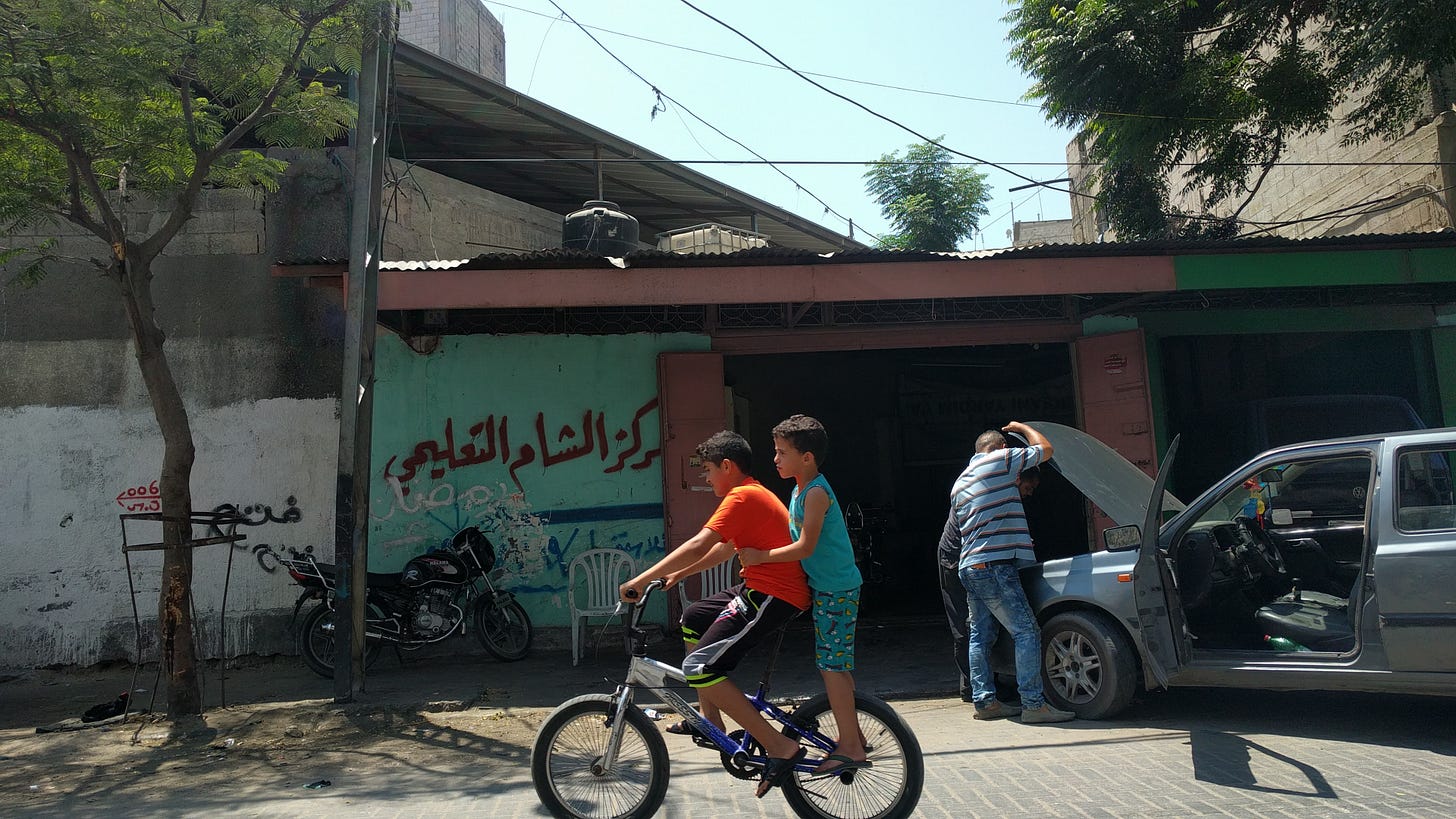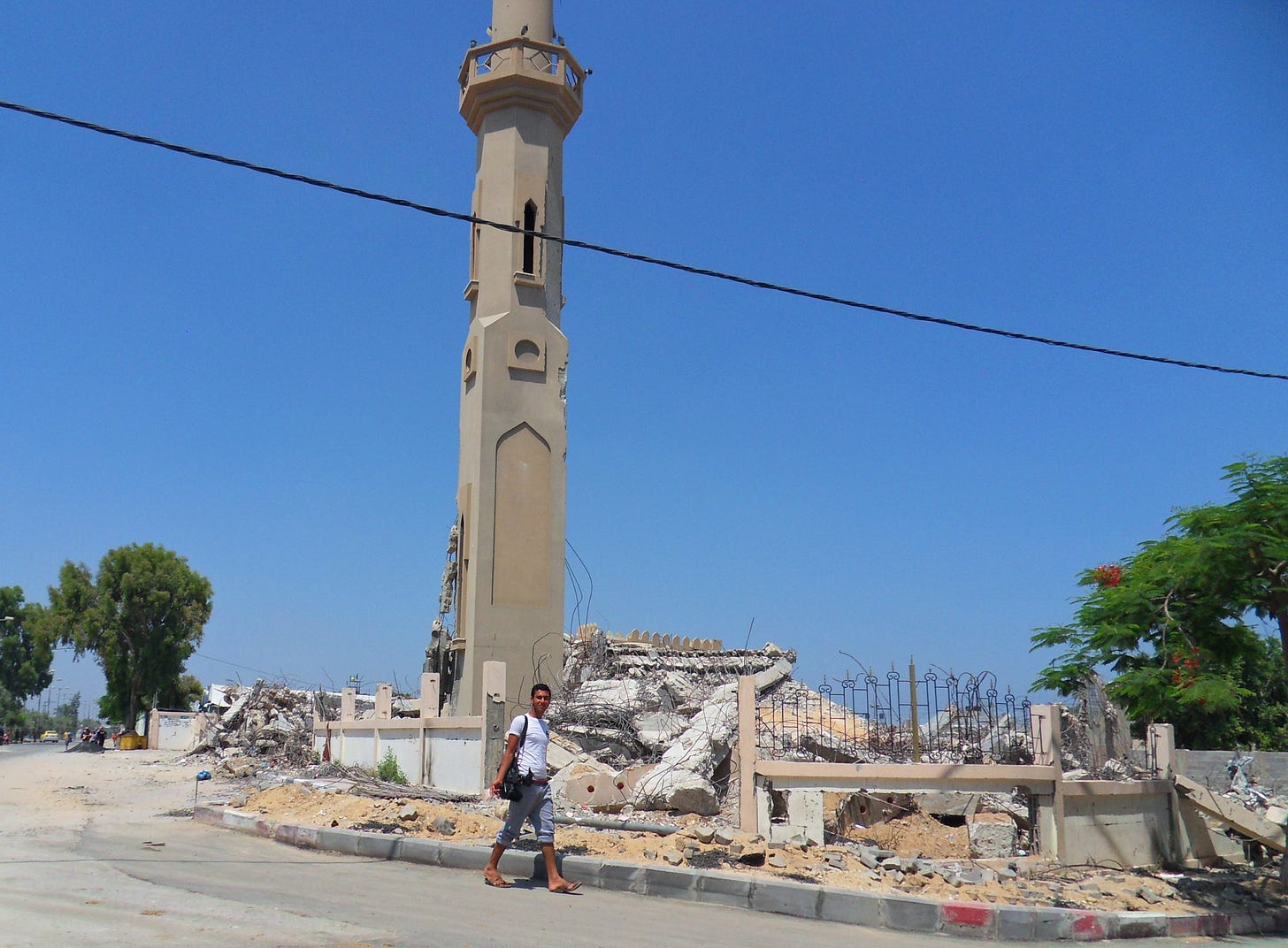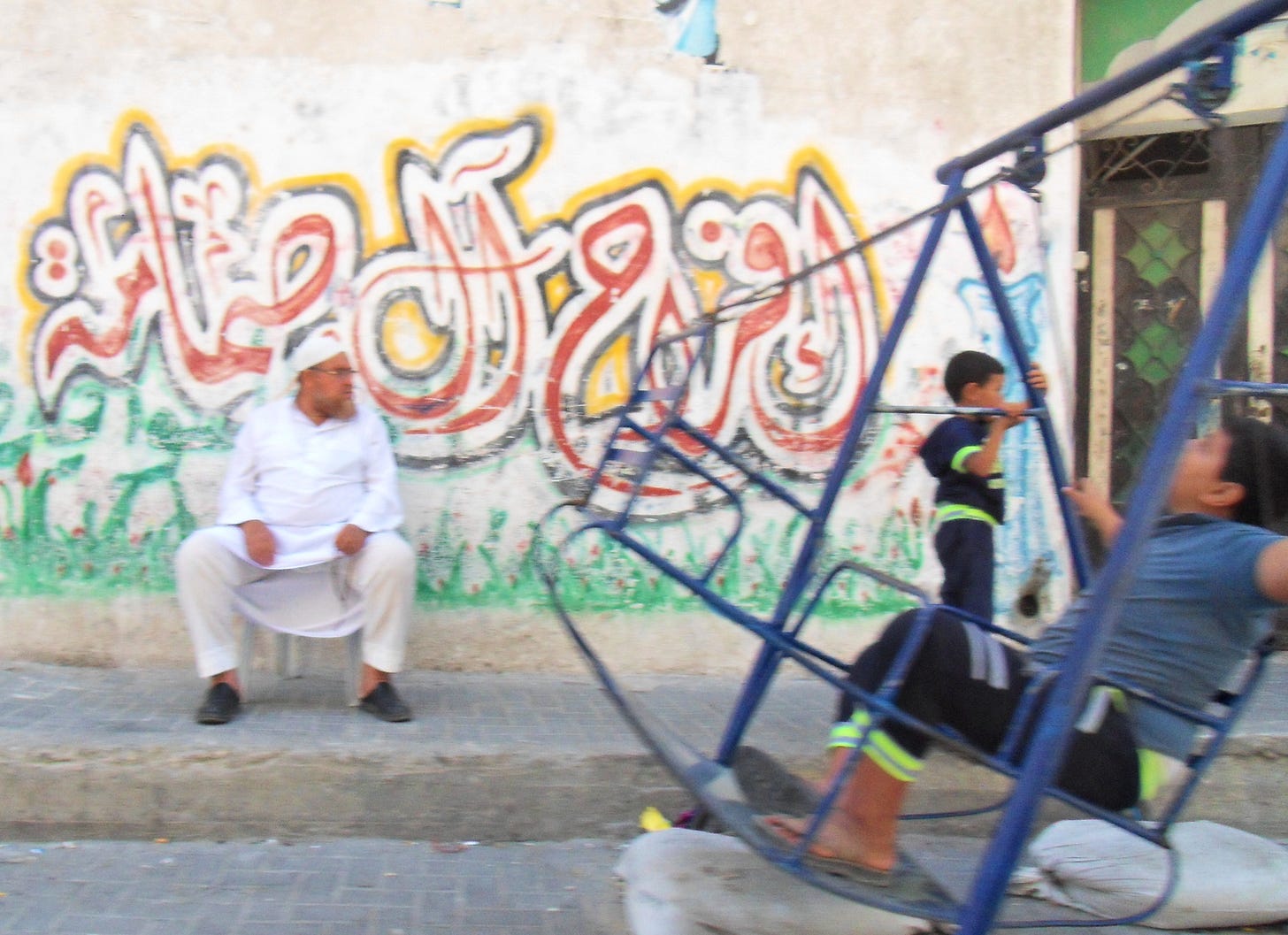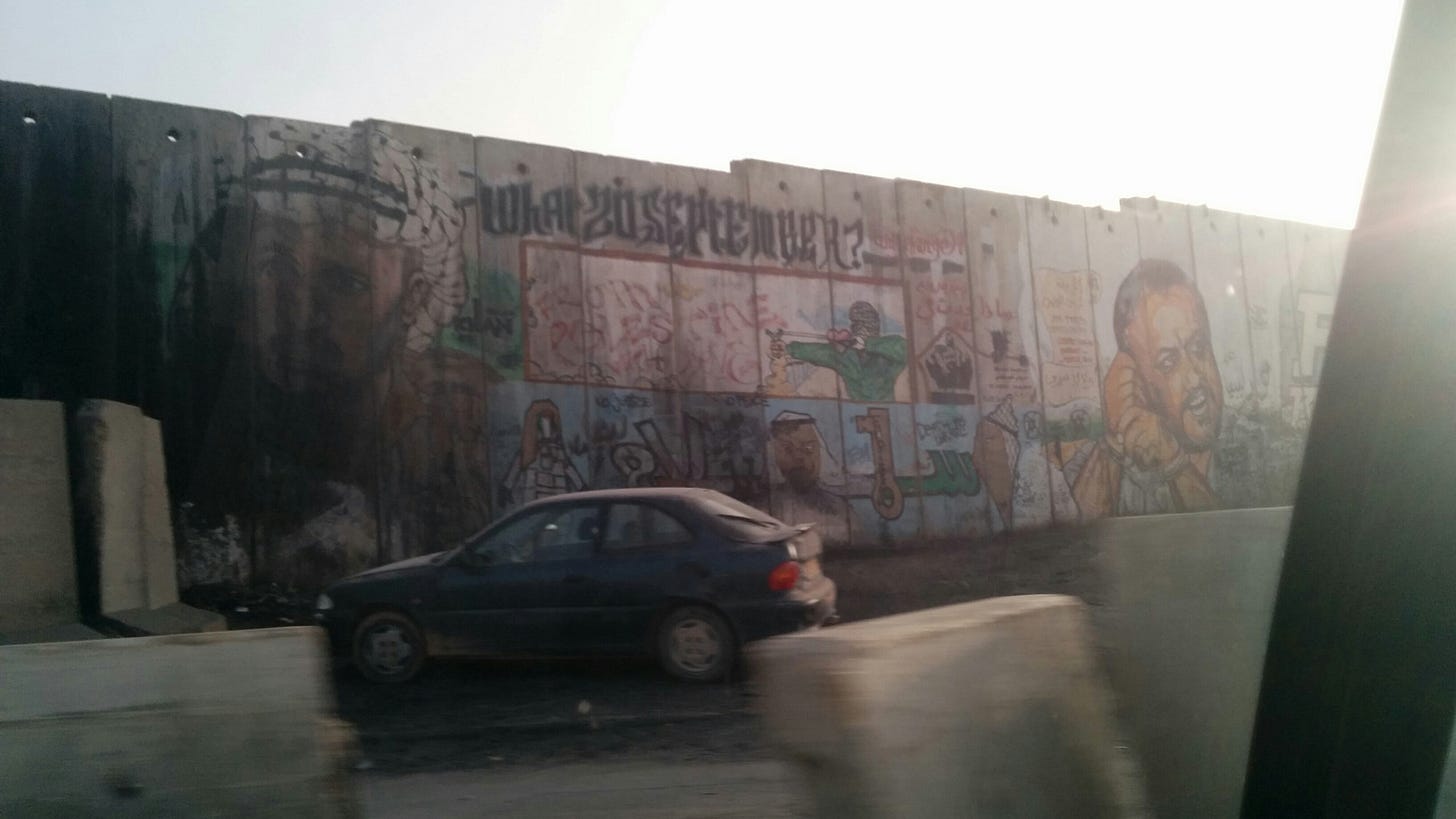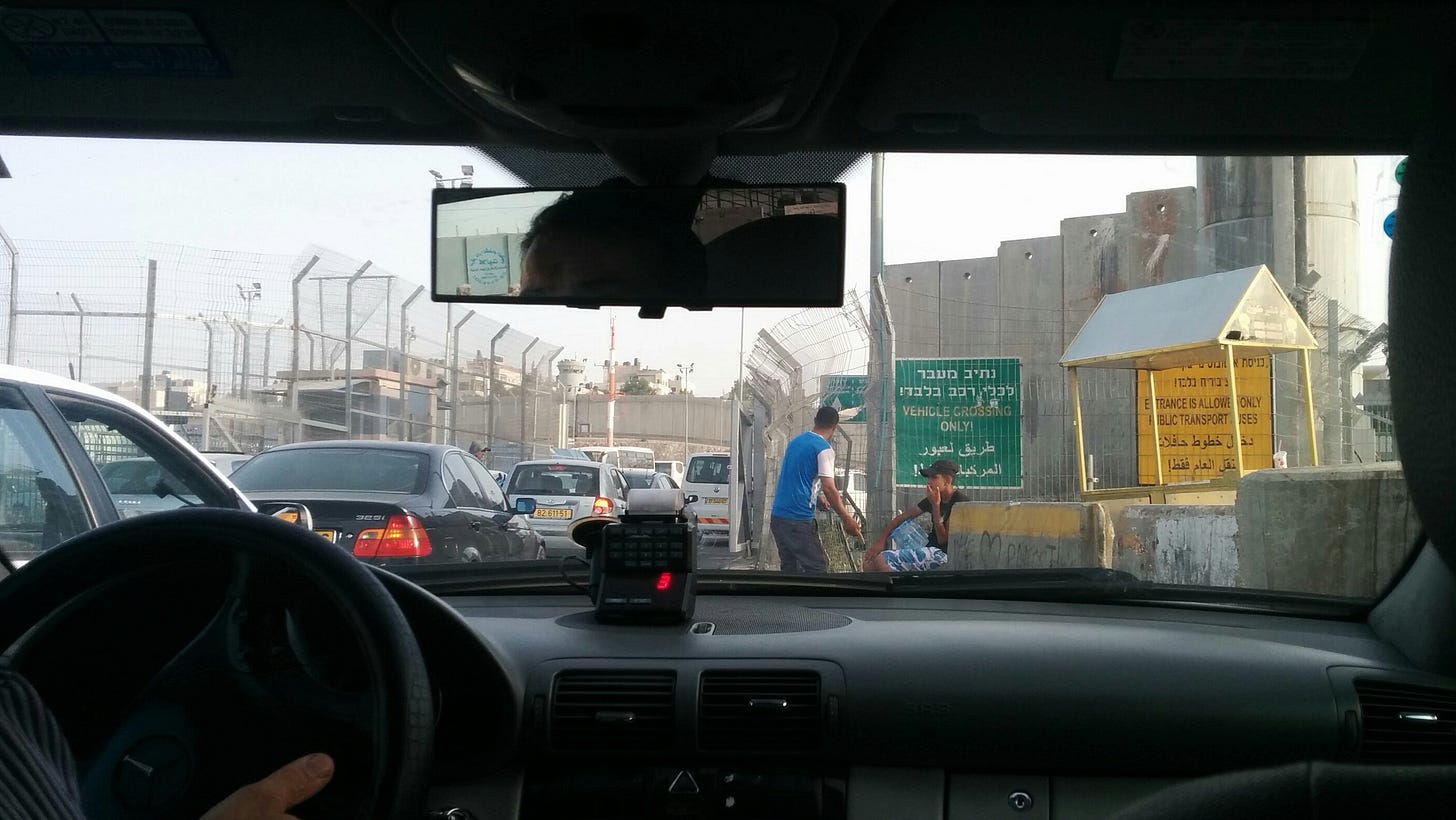What it (Was) Like to Visit Gaza — Part Three
We meet some Gazans, then visit the West Bank
This is an ongoing series describing what it was like to visit Gaza in 2015 and 2017, long before this war. The posts build on each other, so I recommend starting with Part One, and moving to Part Two before coming back here. They’re long but I hope think they’re worth it 💪.
If you’re short on time, we released a podcast episode featuring snippets of these writings. I do recommend reading the posts though, to see photographs of Gaza if nothing else.
And finally, if you’re moved by these stories and would like to help in some way, please reach out to me. I’m happy to recommend places and people to donate to, places to learn more, political actions to take, and more.
Given the challenges of daily life in Gaza, I found it remarkable that anyone there lives anything like what we might call an “ordinary” life, much less an extraordinary one. And yet so many I met — like Lina I described last week, and others today — do, and have; the freedoms and joys many of us take for granted are incredibly hard to come by in Gaza, and yet many there find ways to enjoy them. It’s incredibly humbling to meet someone like this, let alone an entire office full of them.
Everyone I’ll describe was born in Gaza, and most were adults when we met. And most had still never obtained a permit to leave — despite wanting and trying to, and being generous, smart, ambitious people who had every reason to be able to.
I didn’t realize it until preparing this newsletter, but notice how the common thread of pain tying together all these stories is a lack of freedom of movement. Even if Gaza were a lovely place to live — which it, in so many ways, is not — nearly everyone there has, for most of their lives, been incredibly constrained in their ability to leave, and then to come home.
I think those of us in wealthy countries take this freedom for granted. We don’t have to think twice about traveling across the country, and probably to another country, on a whim. “Freedom of movement” is a phrase I’ve heard often in the context of Palestine, and very little elsewhere.
I’ve changed most of the names here to protect identities, but the stories are true. These are some of the people I thought of when I heard Yoav Gallant, the IDF’s defense minister, announce a “complete siege” of Gaza following Hamas’ brutal attack. When he said publicly, “We are fighting against human animals.”
I met Inas Nofal in 2017, and she was at the time Gaza’s only competitive female runner, and an Olympic hopeful. She was only sixteen years old.
Years earlier, Inas had founded a group of female runners in Gaza that had swelled to more than 50 participants, but since dwindled. I’m not certain the reasons why so many of the runners trailed off, but I can guess.
I’ve run a lot throughout my adult life — 5k’s, 10k’s, road marathons, 100-mile trail ultramarathons. Lots. And it is incredibly hard for me to imagine training in Gaza, let alone training in Gaza as a woman. Women aren’t allowed to participate in sports with men, nor to travel alone after dark. It’s hard to get fresh water and there’s a shortage of food. It’s also hot as fuck much of the year, especially if, like Inas, you run with a headscarf. And where do you find a pair of decent running shoes? There’s no Amazon, nor PayPal. Pepsi and Coca-Cola built plants inside Gaza for a reason.
I say all this to emphasize how incredibly challenging it is to be Inas, and yet she kept trying. When I met her in 2017, she had received numerous invitations to participate in prestigious races around Europe, North Africa, the Middle East. But she’d not yet managed to secure permits to leave Gaza to participate in any of them. I’ve tried to imagine what a rollercoaster of emotion each of these invitations must be for Inas, a 16 year-old girl, an Olympic hopeful. An invitation — a waiting period — and finally disappointment — until the next invitation.
Indeed, Inas was once profiled in the Washington Post, describing how just the day before she was set to run a 10k race in Bethlehem — set, too, to leave Gaza for the first time in her life — Israel denied her application for an exit permit, and the permits of more than 100 other invited runners too.
That happened a full year before I met Inas, and she still hadn’t left.
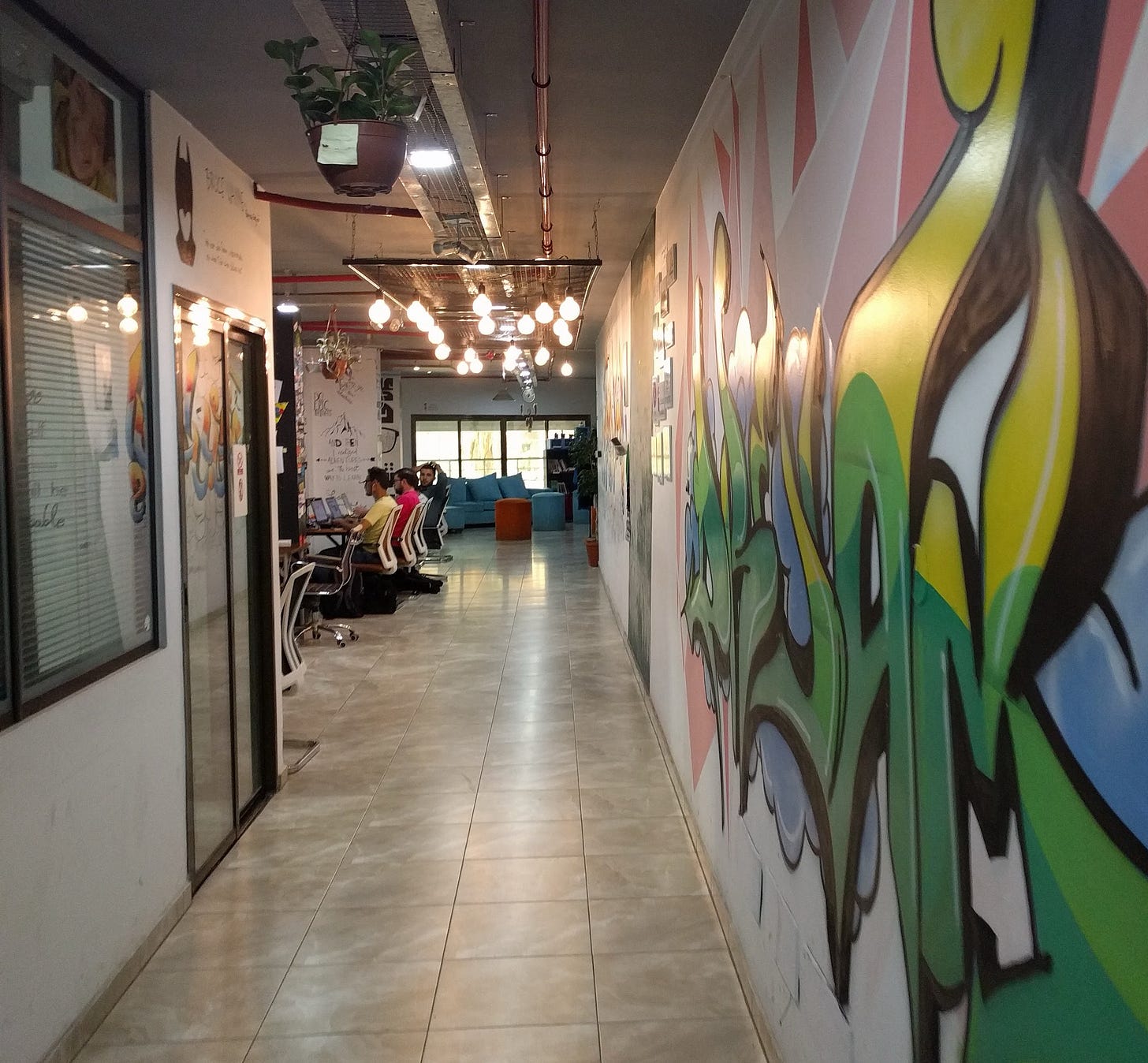
Dahlia is another woman I met at Gaza Sky Geeks. When I looked through photos for these posts, Dahlia is laughing in every one I found with her in it, which comports well with my memory of her. Her laugh reminds me of the laugh of an aunt of mine, who also happened to be a nun. She would smile and laugh a lot when I was a kid, too.
I’ve been checking in with Dahlia occasionally the past few months, and the last message she sent me was this:
Our house was destroyed by the Israeli tanks 😞
I haven't been able to contact my family for more than 40 - 60 seconds
My mother's voice tells me that she is very tired
I wish I can get them out of Gaza.
I mentioned earlier in this series how one of the most amazing things about visiting Gaza was seeing — in so many I met there, and against seemingly insurmountable odds — such surprising ambition and hope for the future. Dahlia is one of the people I specifically think about when I say this.
One of the hard things these past few months has been seeing so many of these people — who for years I’ve known them have somehow found, again and again, reasons to be hopeful — suddenly apparently devoid of that hope, and now just, well, angry. And of course I can’t blame them.
Dahlia, again, is one of the people I specifically think about when I say this.
Dahlia was one of the first to arrive at the office each morning and the last to leave each night. This wouldn’t have been so unremarkable if Hamas, as with Inas, didn’t forbid women from traveling alone after dark. So her brother would travel with her to and from the office each day, a one-hour trip via three shared taxis there and back, just so she could continue working.
Years before I met her, Dahlia was featured in the New York Times as one half of a love story, of sorts. She met a man from the West Bank at a conference in Amman, Jordan, and they fell in love. They returned to their respective homes — she to Gaza, and he to the West Bank — to attempt a long-distance relationship until they could find a way to live together somewhere.
But it’s impossible to go from the West Bank to Gaza without a permit from Israel — a permit that itself is nearly impossible to get. I once met the founder of a venture capital firm in the West Bank who told me, “it’s easier for someone from the West Bank to visit America than to visit Gaza.” Which is extremely hard indeed.
And so Dahlia and her fiancé waited three years to see each other, and then lost hope, and then ended the engagement.
I’d like to share one more story of a Gazan I met before we move on.
I met Omar in 2015, a young man who proudly shook my hand and said he owned the only 3D printer in Gaza, and wanted to build a company out of it. Remember 3D printers?? This was back in 2015, when they were predicted to be one of the Next Big Things in Tech.
I joke about the 3D printer a bit now — there really was a lot of hype around them in the mid-2010’s! — but can you actually think of a more useful place for a 3D printer than Gaza? Again, Coca-Cola and Pepsi built plants there; they would 3D print cans of cola there if they could.
I’ll admit I had some bias against Omar when I met him: he was very confident, very tall, very muscular, very handsome. He looked like the captain of a football team — looked a lot, actually, like Gaston from Beauty and the Beast, if he lived in the desert.
And so some fancy part of my Ivy League-conditioned brain wrote him off as a probable idiot or probable asshole or probably both, and I went into our conversation with low expectations.
But I shouldn’t have. Omar is also extremely smart and well-spoken and, well, sweet. He eagerly told me about his 3D printing company idea for Gaza, about how he’d worked short-term internships and freelance design jobs with various prestigious international companies (remotely, from Gaza.)
Omar told me how he’d recently received an internship opportunity in the US, set to start that fall. I said he must be excited.
And he said he was — but then he caught himself, and stopped. He explained how he’d received the same internship offer the previous fall, in 2014, during Ramadan. But then the war started, the war in which Israel closed the border and fired rockets into Gaza that killed more than 2,000 Palestinians. That was the same war I described last week, during which Lina’s mom smuggled her across the Egyptian border during a short ceasefire.
Omar wasn’t as lucky as Lina though, and had to stay in Gaza, forfeiting the internship.
“I hope I can go this fall,” he said when I met him. “I really hope.”
His voice kept rising as he spoke. I really thought the big, hulking Gaston of a guy might cry.
“Because last year,” he said. “Last year, the war started during Ramadan, and Ramadan is soon again, and I— ” he stopped. “I hope, I really hope. Because I just don’t know, I just….”
“Because if I can’t go this year...”
And I rushed in to say something, hollow reassurances. Something like, “I’m sure it’ll be fine, I’m sure….”
“Yes, I hope,” he said. He forced a smile. “I hope.”

I know I said most of this would be about Gaza, but I want to share a bit of my experience in the West Bank too. Because I spent a few days there as well, and because I think it’s important — Gaza is in the news right now, but the West Bank is a big part of this conflict too.
A good friend is from the West Bank, and we caught up a few weeks ago over the phone. He told me how his parents had recently left for Canada, where they hold dual citizenships. It had just become too hard to get around, they said, between all the new military checkpoints and settlements.
On his podcast in December, Ezra Klein interviewed Nimrod Novik, “a fellow at the Israel Policy Forum and a member of the executive committee of Commanders for Israel’s Security… [and] a senior policy adviser to Shimon Peres when he was prime minister.”
Novik, who is Israeli and has spent a great deal of his life in the Israeli military, described the West Bank as “a Swiss cheese. It’s 169 islands of Palestinian-controlled areas surrounded each by Israeli-controlled territory.”
So hopefully that gives a picture. That whole interview is fantastic for more context on this conflict, by the way — in fact, Klein ran a whole series of shows speaking with experts on all sorts of sides of this conflict the last few months, and I recommend listening to all of them. Novik’s, especially, stood out to me — I found it incredibly refreshing to hear the words of a man steeped in Israeli security concerns who nevertheless seems to hold an empathetic and pragmatic view of the needs of Palestinians for self-determination and freedom.
I spent a couple days in Ramallah on my first visit, working with startups there before going to Gaza. Ramallah is the West Bank’s de facto capital, and the city sits about an hour’s drive north of Jerusalem, in the middle of the whole Israel / Palestine area on a map. Ramallah exists on a very different socioeconomic plane, and seemingly different decade, than Tel Aviv and West Jerusalem. Glass and metal skyscrapers scrape those skylines, while Ramallah’s is filled with older, smaller concrete structures. The city felt aesthetically similar to what I saw in Gaza, though things were unsurprisingly newer, and in better shape. Most streets lacked signs, so as we entered the city our driver stopped three times to ask directions out his window. And the responses we got all went something like, “Drive to the statue, take a left, and ask for help again.”
You can get alcohol in Palestine, which surprises most. Not in Gaza, Hamas won’t allow it — at least, not officially, though we heard rumors of fun UN parties — but in the West Bank you can. A Palestinian from the tech accelerator in Ramallah took me to a place called Snowbar, where I ate some of the best falafel of my life.
To get there we exited the car and descended steps from the road into what felt like a deep and surprisingly lush forest, and then emerged onto a massive wooden patio topped by cabanas and deck chairs clustered around a tremendous bonfire. People sat on the chairs and cabanas eating and drinking, and it felt a bit like summer camp, nestled among the trees around the fire. There’s a large projection screen for movies, and even a swimming pool. Sitting at Snowbar, it’s very easy to forget you’re in the desert, and especially Palestine.

To go between Jerusalem and Ramallah, we had to cross multiple checkpoints run by the IDF. It’s hard to imagine what a “checkpoint” looks like, I think; I could never quite picture one, even when hearing stories from my high school German teacher about Berlin’s Checkpoint Charlie. But some of the checkpoints we passed through to and from Ramallah, at least, felt like full-fledged, no-bullshit border crossings between two countries. The checkpoints were lined by fences topped with razor wire and staffed by Israeli guards holding automatic rifles. Some of the guards held leashes attached to vicious-looking dogs.
On the way out to Ramallah from Jerusalem, our driver, a Palestinian employee of the aid organization hosting me, asked me and the other passenger if he could take a detour. He said it would allow us to avoid Qalandiya, the most infamous of the checkpoints. The detour would add a half hour to our trip; the drive was only an hour to begin with, so that’s a whole fifty percent increase. But he said “I hate Qalandiya,” and the other passenger and I shrugged and said sure, why not.
But days later when I returned to Jerusalem, it was with a different driver. Whether by choice or necessity — I don’t know which — he chose to drive through Qalandiya. Compared with other crossings I experienced Qalandiya was larger, more intimidating, and had far worse traffic. In addition to the usual layers of chain link fencing and rolls of razor wire, tall concrete walls covered in graffiti hemmed in the lanes of cars inching through the gates toward Jerusalem.
Our driver stopped the car beside an IDF soldier who leaned down to examine his permit. It was very hot, and I watched the late afternoon sun reflect off the automatic rifle on his shoulder as we sat idling, waiting for him to let us pass.
Thousands of Palestinians commute through checkpoints like Qalandiya each day, to and from work in Jerusalem, Palestine’s largest economic hub. Imagine passing the checkpoint twice a day, every day for work — the sun, the cars, the razor wire, the big white walls covered in graffiti and the big ugly signs telling you where to go around them. Waiting on men with automatic weapons and dogs trained in violence to say whether or not you can pass.
The whole thing feels like a war zone, and it’s just your daily commute.
That’s it for this week — thank you for tuning in. Next week will wrap up this series on Gaza, and then we’ll get back to our regularly scheduled programming 📺
Again, if any of this moves you and you’d like to donate or otherwise do something to help with the current situation in Gaza (and the West Bank too, which is seeing a great deal of violence and hardship, only more quietly), please reach out to me and ask.
Song of the Week: Rasha Nahas — Desert


